
Werner Herzog is a German filmmaker, actor, opera director, and author. Regarded as a pioneer of New German Cinema, his films often feature ambitious protagonists with impossible dreams, people with unusual talents in obscure fields, or individuals in conflict with nature. His style involves avoiding storyboards, emphasizing improvisation, and placing his cast and crew into real situations mirroring those in the film they are working on.

Aguirre, the Wrath of God is a 1972 epic historical drama film produced, written and directed by Werner Herzog. Klaus Kinski stars in the title role of Spanish soldier Lope de Aguirre, who leads a group of conquistadores down the Amazon River in South America in search of the legendary city of gold, El Dorado. The accompanying soundtrack was composed and performed by kosmische musik band Popol Vuh. The film is an international co-production between West Germany and Mexico.
New German Cinema is a period in West German cinema which lasted from 1962 to 1982, in which a new generation of directors emerged who, working with low budgets, and influenced by the French New Wave and Italian Neorealism, gained notice by producing a number of "small" motion pictures that caught the attention of art house audiences. These filmmakers included Percy Adlon, Harun Farocki, Rainer Werner Fassbinder, Peter Fleischmann, Werner Herzog, Alexander Kluge, Ulli Lommel, Wolfgang Petersen, Volker Schlöndorff, Helma Sanders-Brahms, Werner Schroeter, Hans-Jürgen Syberberg, Margarethe von Trotta and Wim Wenders. As a result of the attention they garnered, they were able to create better-financed productions which were backed by the big US studios. However, most of these larger films were commercial failures and the movement was heavily dependent on subsidies. By 1977, 80% of a budget for a typical West German film was ensured by a subsidy.
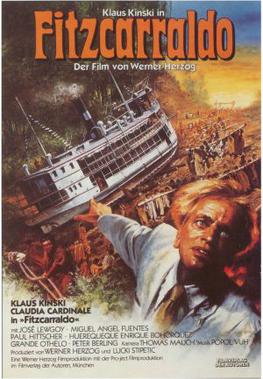
Fitzcarraldo is a 1982 West German epic adventure-drama film written, produced, and directed by Werner Herzog, and starring Klaus Kinski as would-be rubber baron Brian Sweeney Fitzgerald, an Irishman known in Peru as Fitzcarraldo, who is determined to transport a steamship over the Andes mountains to access a rich rubber territory in the Amazon basin. The character was inspired by Peruvian rubber baron Carlos Fitzcarrald, who once transported a disassembled steamboat over the Isthmus of Fitzcarrald.
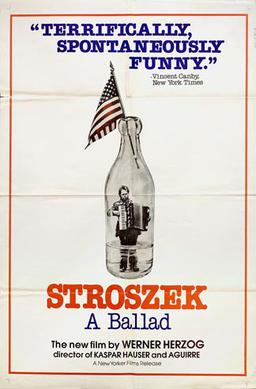
Stroszek is a 1977 West German tragicomedy film directed by Werner Herzog and starring Bruno S., Eva Mattes, and Clemens Scheitz. Written specifically for Bruno S., the film was shot in Plainfield, Wisconsin, and North Carolina. Most of the lead roles are played by inexperienced actors.
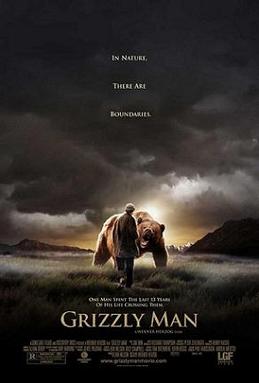
Grizzly Man is a 2005 American documentary film by German director Werner Herzog. It chronicles the life and death of bear enthusiast and conservationist Timothy Treadwell and his girlfriend Amie Huguenard at Katmai National Park, Alaska. The film includes some of Treadwell's own footage of his interactions with brown bears before 2003, and of interviews with people who knew or were involved with Treadwell, in addition to professionals who deal with wild bears.
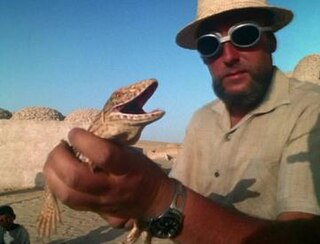
Fata Morgana is a 1971 film by Werner Herzog, shot in 1968 and 1969, which captures mirages in the Sahara and Sahel deserts. Herzog also wrote the narration by Lotte H. Eisner, which recounts the Mayan creation myth, the Popol Vuh.

Werner Herzog Eats His Shoe is a short documentary film directed by Les Blank in 1980, that depicts director Werner Herzog living up to his alleged vow to eat his shoe if Errol Morris ever completed the film Gates of Heaven.

Little Dieter Needs to Fly is a 1997 German-British-French documentary film written and directed by Werner Herzog, produced by Werner Herzog Filmproduktion, and premiered on German television. The film follows the life of Dieter Dengler, in particular being shot down during the Vietnam War and his capture, imprisonment, escape, and rescue. Herzog went on to direct a dramatized version of the story, Rescue Dawn, which stars Christian Bale as Dengler in 2006.

Le Silence de la mer is a 1949 French war drama film written and directed by Jean-Pierre Melville, in his directorial debut. Adapted from the 1942 novella of the same name written by Vercors. Set during the Second World War in occupied France, the story concerns the relationship of a Frenchman and his niece with a German lieutenant who is billetted in their house.

Where Is the Friend's House? is a 1987 Iranian drama film written and directed by Abbas Kiarostami. The plot depicts a conscientious schoolboy's attempt to return his friend's school notebook to his home in a neighboring village, to prevent the friend from being expelled if he fails to hand it in the next day. The film, whose title derives from a poem by Sohrab Sepehri, is the first installment in Kiarostami's Koker trilogy, followed by And Life Goes On and Through the Olive Trees, all of which take place in Koker, Iran.
Lotte H. Eisner was a German-French writer, film critic, archivist and curator. Eisner worked initially as a film critic in Berlin, then in Paris where in 1936 she met Henri Langlois with whom she founded the Cinémathèque Française.
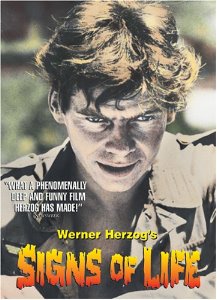
Signs of Life is a 1968 feature film written, directed, and produced by Werner Herzog. It was his first feature film, and his first major commercial and critical success. The story is roughly based on the short story "Der Tolle Invalide auf dem Fort Ratonneau" by Achim von Arnim.
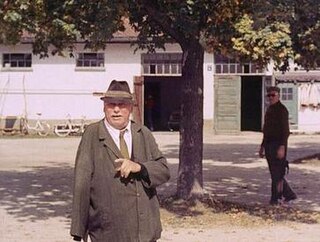
Precautions Against Fanatics is a short film by Werner Herzog filmed at a harness racing track near Munich, Germany. It was Herzog's first film shot in color.
![<i>Portrait Werner Herzog</i> [[West Germany]] film](https://upload.wikimedia.org/wikipedia/en/thumb/5/5e/Herzog_eisner.jpg/320px-Herzog_eisner.jpg)
Portrait Werner Herzog is an autobiographical short film by Werner Herzog made in 1986. Herzog tells stories about his life and career.

Into the Abyss is a 2011 documentary film written and directed by Werner Herzog. It is about capital punishment, and focuses on a triple homicide that occurred in Montgomery County, Texas, in 2001. In the film, Herzog interviews the two young men convicted of the crime, Michael Perry and Jason Burkett, as well as family members and acquaintances of the victims and criminals, and individuals who have taken part in executions in Texas. The primary focus of the film is not the details of the case or the question of Michael and Jason's guilt or innocence, and, although Herzog's voice can be heard as he conducts the interviews, there is a minimal amount of narration, and he never appears onscreen, unlike in many of his films.

Family Romance, LLC is a 2019 American drama film directed by Werner Herzog. It stars Yuichi Ishii and Mahiro Tanimoto. The film had its world premiere in the Special Screenings section at the 2019 Cannes Film Festival on May 18, 2019.

Nomad: In the Footsteps of Bruce Chatwin is a 2019 British documentary film by German director Werner Herzog. It chronicles the life of British travel writer Bruce Chatwin and includes interviews with Chatwin's widow, Elizabeth Chatwin, and biographer Nicholas Shakespeare, as well as detailing Herzog's own friendship and collaboration with the man.
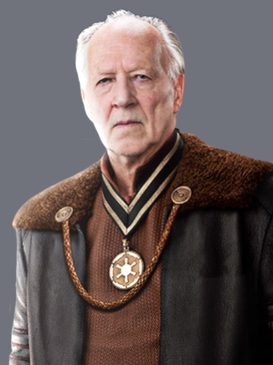
The Client is a fictional character in the Star Wars franchise who appears in three episodes of the first season of the Disney+ television series The Mandalorian. He is a mysterious, unnamed leader in the former Galactic Empire and subordinate of Moff Gideon, who plays a key role in setting the show's story into motion by hiring the bounty hunter known as "The Mandalorian" to retrieve a "50-year-old", yet infantile alien dubbed "The Child".

Werner Herzog is a German filmmaker whose films often feature ambitious or deranged protagonists with impossible dreams. Herzog's works span myriad genres and mediums, but he is particularly well known for his documentary films, which he typically narrates.












![<i>Portrait Werner Herzog</i> [[West Germany]] film](https://upload.wikimedia.org/wikipedia/en/thumb/5/5e/Herzog_eisner.jpg/320px-Herzog_eisner.jpg)




